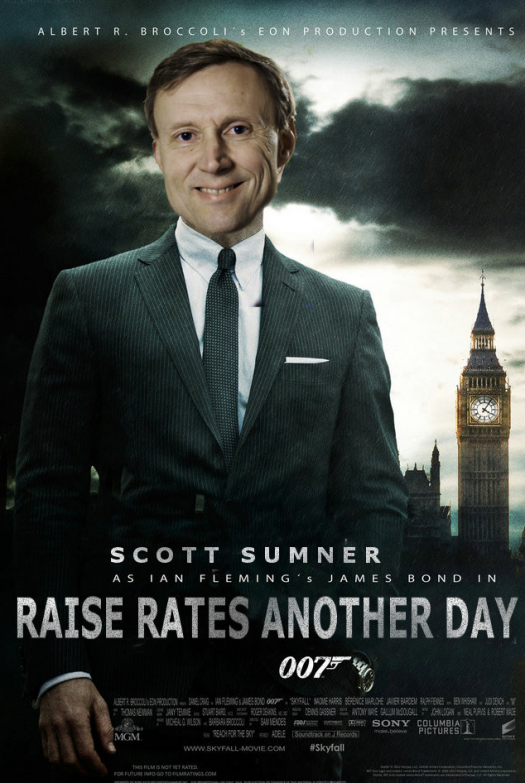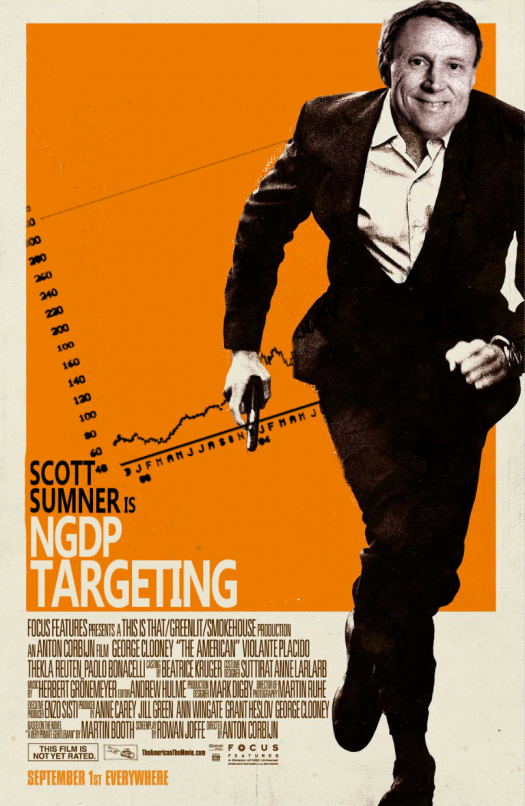Two good questions
The comment sections of my Trump posts continue to be a cesspool overflowing with alt-right idiocy. One recent commenter suggested that perhaps Soros was funding those KKK groups that support Trump, just to make Trump look bad.
Commenters ask me to get back to macro, but when I do nobody pays attention. My recent post on inflation attracted three comments (excluding my two responses.)
But they were good questions:
What’s the case for Trump not moving the Fed in a more dovish direction, either through persuasion or appointments. That could explain an increase in inflation expectations and preserves monetary offset. (Ant1900)
I responded:
I think the strongest argument goes as follows. The Fed normally aims for 2%, but falls short in recessions. So inflation (post-2007) averages a bit under 2%. Trump’s supply-side reforms will make a recession less likely. So [long term] inflation expectations rise, but remain under 2%.
That might seem a bit ad hoc, and I certainly don’t have any great confidence in this explanation. But it does at least explain why TIPS spreads remain below 2% for both the 5 and 10-year T-bonds. (The 30-year yield will almost always be higher due to tail risk.)
Another comment:
I completely agree that we are more likely to experience continued low inflation rather than some sudden increase. Infrastructure spending won’t do the job of increasing inflation. Japan is an obvious counter example of the effects of monetary offset. Yet the media and some commentators seem to forget this entirely. At the end, one risk we face is that we might end up having a more hawkish Fed that goes too far with the offset, with corresponding economic consequences.
My question: wouldn’t supply-side policies ease price pressures, leading cp to lower inflation and lower bond yields? To me, the observed increase in bond yields remains mysterious. (Fran)
You’d think that supply-side policies would reduce bond yields. After all, they tend to reduce inflation, other things equal, and lower inflation reduces bond yields. In fact, successful supply-side policies actually raise bond yields, at least when the Fed is targeting inflation at 2%. If tax cuts and deregulation boost growth, the Fed will tighten enough to keep inflation at roughly 2%. But even so, RGDP growth will increase. And because NGDP growth is RGDP growth plus inflation (2%), NGDP growth will also increase. And this is why bond yields will rise—they depend more on NGDP growth than inflation. People don’t notice that distinction when both move in the same direction (as in the 1970s, when both were high.) But when NGDP growth slows and inflation rises (as in mid 2008) we see that it is NGDP growth that matters more for interest rates.
Here’s my take on recent market moves, FWIW. A quick knee jerk fall on election night on fear of populist policies. A rally over the next few days as Trump people sent out messages that the worst parts of the populism (expelling 11 million illegals, 45% tariffs, etc.) will be dropped, and tax cuts, infrastructure and deregulation will be promoted. But note that markets have not moved up all that much; the bond yields still suggest slow growth ahead, and TIPS spreads still suggest slightly below 2% inflation. It’s not a game changer, probably . . .
There are actually two ways of interpreting the modest market reaction:
1. Supply-side policies are simply not that effective; they don’t boost growth as much as the advocates claim.
2. The market sees only a very modest probability that Trump will enact major supply-side reforms, either because he doesn’t want to, or because Congress will water it all down.
Long time readers know that I’m a moderate supply-sider. I think talk of boosting trend RGDP growth to 4% or 6% is silly. But I am a supply-sider, and I do think that if the markets were 100% sure we’d dramatically cut taxes on capital (as Trump has proposed) and dramatically deregulated, then markets (and real bond yields) would have risen much more. Thus I think it’s both. Supply-side policies really can be fairly effective, even as they are much less effective than proponents claim, and there really is uncertainty about how much Trump will accomplish. Thus here’s a conditional forecast. If Trump really were to get a strong supply-side agenda enacted, markets would rally even more.
PS. Trump’s proposed fiscal policy is still a populist horror show, which would balloon the national debt. We still don’t know if Trump will back off on that, once his advisers (or Congress) recognize the price tag. So don’t take these comments on the supply-side aspects of Trump’s plan as some sort of endorsement of the overall program. And again, we are still in the speculation stage.
PPS. I hope all those peacenik Trumpistas saw the Bolton for Secretary of State rumors. He probably won’t get the post, but you gotta wonder how his name even came up. The leading name is Giuliani. Maybe somebody told Trump that Bolton is “tough”. Loved Josh Marshall’s reaction:
PPPS. Hey Trumpistas, don’t say I never do anything for you. Here’s an article on the working class that you will actually like, showing how out of touch the elites are. As for you elites, it’s a pretty good article, even if you don’t agree with it.
PPPPS. Well doesn’t this inspire confidence:
President-elect Donald Trump has alienated many of the nation’s most senior national security officials and veteran foreign policy experts, leaving him with an apparent shortage of qualified Republicans willing to serve in his administration.
Trump’s transition team — many of whom are relative political outsiders who apparently didn’t realize that President Barack Obama’s entire West Wing staff would have to be replaced — are reportedly scrambling to fill Trump’s transition team before Inauguration Day.
But at least Trump’s not vindictive towards those who opposed him:
Eliot Cohen, a former State Department officer and Defense Department official who signed the August letter, also said it would not surprise him “in the slightest” if Trump had effectively blacklisted those in the national security community who had spoken out against him.
“If its true, I’ll wear it as a badge of honor, though,” Cohen told Business Insider on Monday. “And you can quote me on that.”
Cohen wrote last week that rather than move to Canada, Americans dismayed by a Trump administration should maintain “constant vigilance” over the US’s free institutions and “say yes” if they’re asked to work for him.
But by Tuesday morning, he’d changed his mind.
“After exchange [with] Trump transition team, changed my recommendation: Stay away,” Cohen tweeted. “They’re angry, arrogant, screaming ‘you LOST!’ Will be ugly.”
The Trump transition team didn’t respond to a request for comment on this story.
Lovely. Of course none of this matters; Trump will be advised on strategy by his alt-right, self described “Leninist”, who wants to “destroy” the establishment. What could go wrong? Who needs experts? “They got us into this mess.” China did fine during 1966-76 with the experts sent to the countryside to feed pigs.
And how about this:
Retired neurosurgeon Ben Carson, a former 2016 Republican presidential candidate who is an adviser to President-elect Donald Trump, has opted against accepting a Cabinet position in the Trump administration, his spokesman said on Tuesday.
Carson, a popular writer and speaker in conservative circles, has been a close adviser to Trump and is a vice chairman of Trump’s transition team.
He has been mentioned as a possible secretary of health and human services or education.
“Don’t worry, Trump will be surrounded by experts.”




